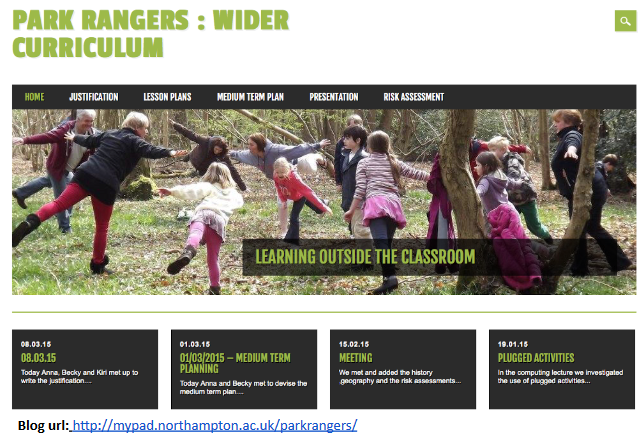Student group blogs to explore learning outside the classroom pedagogy
Group blogs were used as an assessment tool to demonstrate how Primary PGCE students applied a Learning Outside the Classroom (LOC) approach to study foundation subjects in the UK National Curriculum. The students created blogs in groups of four over the course of an academic year documenting reflection on their own learning experiences of LOC practices. The LOC practices shared included generation of short and long term plans, and examples of their application of ideas to practice. Over time, the students’ reflection occurred both in action, on action and for action (Schon, 1983[1]) as they refined their ideas through site visits, on campus and during school placements. They documented this ongoing development over time through regular journal entries on their blogs, often using collaborative online tools such as Google Docs, Prezi, Padlet, Skype and Facebook. At the end of the year, they used the page options on the blogs to present summaries of their learning in the form of a theoretical rationale, a justification for LOC, a set of curriculum plans and a group presentation. In this way, the finished digital artefact provided evidence of how the collective competence of the group grew over time as they built a shared repertoire of strategies for teaching foundation subjects through LOC.
Example:
The sample group blog below demonstrates an example of student practice. The blog has acted as a tool for the students to communicate their knowledge and understanding of creative approaches to learning within an authentic real world context. They have been able to work collaboratively despite being geographically dispersed and the medium gave them control over the time, pace and place of learning. The students have been able to add and reflect on each other’s contributions whilst creating innovative learning opportunities that they can now take forward into their professional practice.
Group blog learning outcomes:
· Peer to peer learning has occurred and evidence has been provided that student learning has been developmental throughout the year spanning pedagogy and practice. This represents a move away from teacher directed pedagogy towards a flexible learner centered approach.
· The use of the blog as an assessment tool has been effective to demonstrate group contributions and critique of practice; the students have also been able to produce a variety of media within the assessment, multiplying the learning opportunities.
· Learning has spread across multiple institutions. The students have been able to draw on pedagogy in different school settings and have shared this collaboratively to alter practice in different learning domains.
Source: Caldwell et. al. 2016
References:
Caldwell, H., Bracey,, P, Heaton, R. and Whewell, E. (2016). Student group blogs to explore learning outside the classroom pedagogy. In: Outside the Box Assessment and Feedback Practices. Vol 2 No 1 p1-2.
Schon, D. (1983) The Reflective Practitioner. New York: Basic Books.


